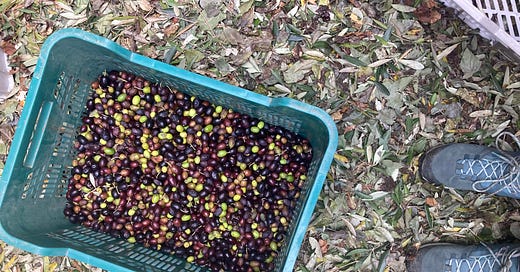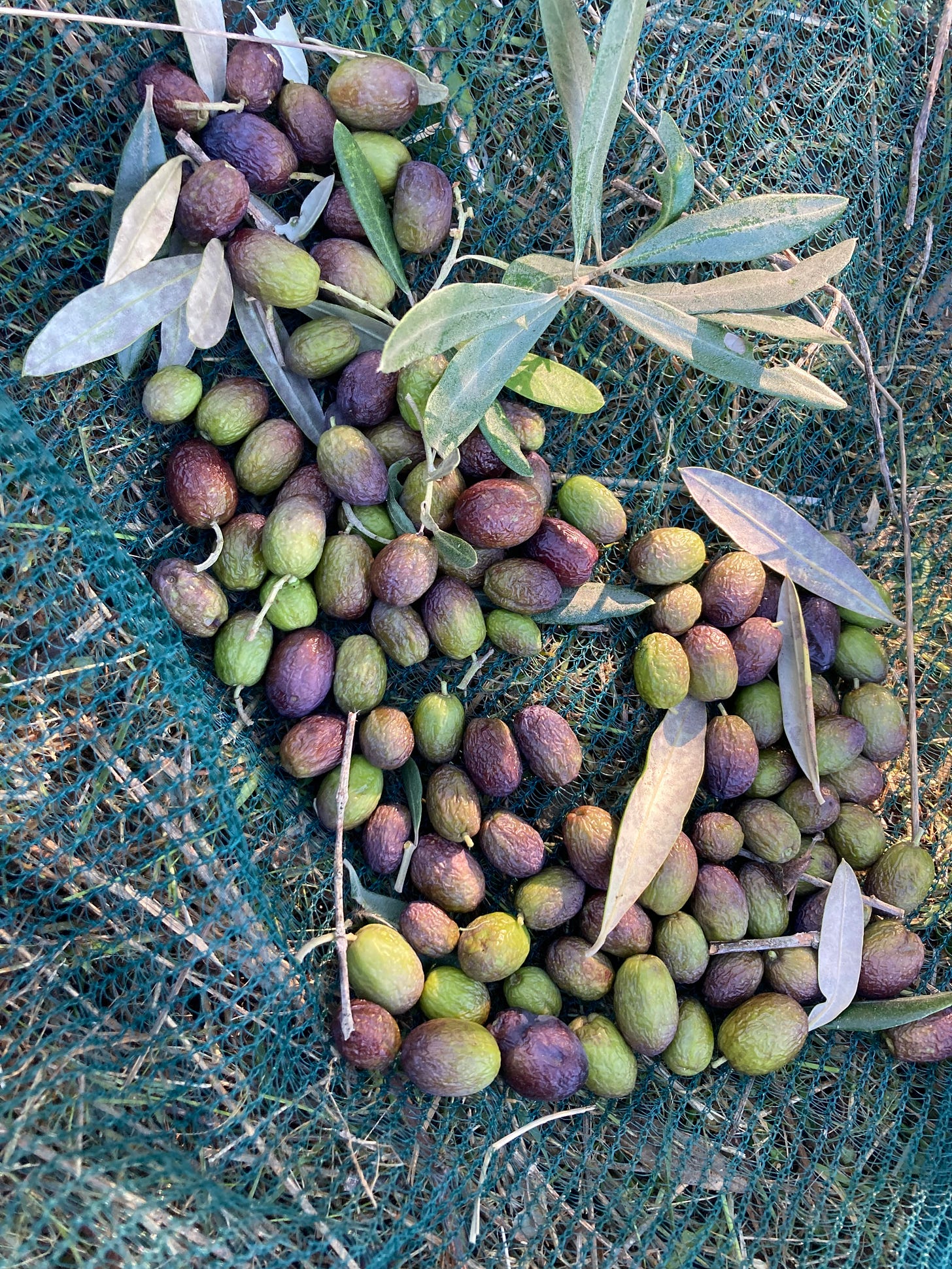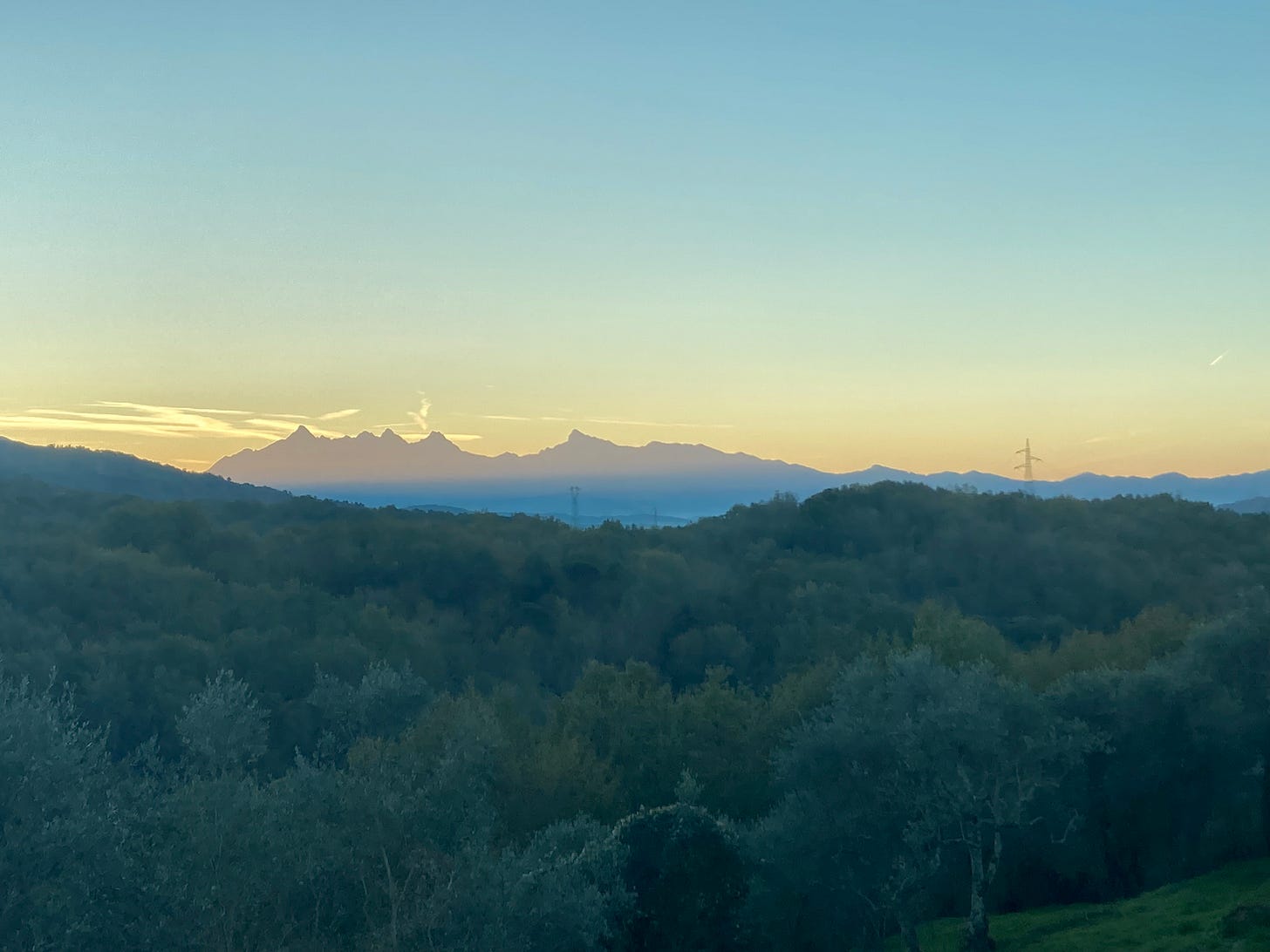I harvested olives for the first time in my life, here's what I learned
Or, finding balance between AGI and olive trees.
Picture this: you're standing on an olive tree branch, it feels strong and sturdy under you, gracefully taking your weight. The dry bark gives you grip and you feel ease holding to the tree. You look around, wide awareness, looking for the slightly different shape. You spot a bunch of olives, round against the blue sky.
You reach your hand into the messy bush of leaves, thin and yet astoundingly intricate, and grab the twig. You feel your hand modulating the pressure as it slides, tightening the grip to pick the olive, letting the leaves slide through. Then the satisfying thumpf, thumpf, thumpf. Little hard things falling in a bucket. You've been here a while, moving around in the crisp fall sun, your body is pleasantly tired. There's still a bunch of olive trees to harvest. You breath freely.
Well, I harvested olives for the first time in my life last week and it was wonderful. It prompted such a variety of thoughts and I'm excited to share them.
First, the sensory experience. Just the feeling of being there: the simple pleasure of manual work, the smoothness and strength of the pulp, the beautiful colours, all the variations of olive green, all the variation of shapes between olives and between trees. The way different trees are clearly all olive trees and yet feel and look so different. Some are young and thin and light. Some are long and melancholic. Some are sturdy and ancient. Some are tall and filled with olives. Some are so covered in other vines that they are barely visible, yet they are still making fruits. The back pain of bending often, reaching for the floor - a rare movement in my everyday life, a painfully familiar one for anyone harvesting. The pain of thorns, their insidiousness. The way olive trees specifically, with their whiter leaf underbelly, look like cartoon trees in the pink sunset light over the hills of Tuscany. The challenge and rewards of working with others and figuring out a rhythm, flowing with coordination. Feeling the abundance of the land, the food literally hanging from trees.
Then there's the fascinating practical side. Olive harvesting is quite labor-intensive. Olives are tiny! They grow like fruits on trees, relatively sparse, relatively sturdy. You have to pick them before they fall, they can grow quite high up. If they fall on the ground it's very unlikely to find them in the grass. And yet, you want all of them - they only produce around 10-12% of their weight in oil. So if you spent 6 hours collecting 100kg of olives... that's just about 13 liters of oil. Not accounting for caring for the trees and making the oil. I have so much more appreciation now for oil existing at all and being so easily available.
Anyway, harvests. Olives are small; it takes some attention to see them; here in Tuscany, they are either green or brownish/purple. Both are hard to see! Once you see them.. Well, some -many - are really high up, it takes some skill to climb the trees, and some strength to get them off the branch. So, people invented tools! They have been harvesting olives around here for thousands of years, isn’t that wild? It brings to mind the uncanny human ability to try out new moves and copy the ones that work and how optimised a process that happened so many times over so many generations can be. So there's tools: a long stick, with little hands on one end that make a very specific movement, get the olives and leave most of the leaves. They are long and heavy; I could hold one for just a bit. The man in charge did it for hours. They have batteries too that one needs to carry around. People used specific rakes in the past, with dents thin enough to catch the olives.
And then there's the nets. To catch the olives, people spread giant nets under the trees, and then wiggle them to collect the harvest. It sounds easy and reasonable, but there's so much that can go wrong. The nets are huge and take multiple people to place; they get stuck in all sorts of thorns and grass, they get holes, and you need to be careful about the edges, or your olives might roll away - many trees grow on terraced land. Many layers of knowledge and process optimization are condensed into a few tools. And these tools are only useful once a year! Who owns them? Who gets to use them? Who lends them to whom? The delicate dynamics of a little mountain village where most people were born and never left, only community for each other for 70+ years.
The harvest used to be a party because it's labor where more hands make all the difference. Until not long ago, people would come from cities where they moved for work to help their relatives harvest. Some still do, less and less.
On a personal level, this experience brought clarity to a major theme in my life lately: integrating different sides of myself - the feral one who wants to run naked in the woods and warm up only with firewood and the fancy one who wants to wear pretty dresses and talk about AGI. And I felt a new balance starting to come through: a few days of intense conference mode working days - only work, there's important people waiting on me to finish the thing and the thing matters to the future of humanity - and a few days of peasant life - harvesting all day, sitting by the fire and eating homemade food all night. And then even a fusion version! A morning of social media managing and LaTeX, followed by an afternoon of roaming the fields and climbing trees, and an evening of chill cozy low key, worky stuff. And that felt sustainable. Like the kind of rhythm I could actually not burn out from.
There's also something profound about doing what needs to be done. I did the family version of harvesting. It's a few trees; they all have different owners who take different amounts of care of them, and they aren't particularly full of olives or easy to harvest. And yet, they made olives, a gift from Mother Earth, and someone's gotta honour the gift. Receive what comes from nature and treat it with the sacredness and reverence it deserves - carefully collecting the olives, cleaning them, bringing them to the oil mill, storing the oil well - whether human market prices agree or not. I'm being paid a reasonable hourly rate for my editing these days; if I factor that into the calculations, this harvest cost me money. And it feels crystal clear what I'm paying for. I don't need infinite money for unclear future luxury. I need clarity on what I want and enough money for that.
Appreciating the connection to the rhythms of nature. Now she gives - receive and rejoice, for winter is long. She’s generous, but not stupid, she gives to those who can appreciate the gift.
I'm told I'll get some olive oil too! Definitely go harvesting olives if you ever get the chance.





